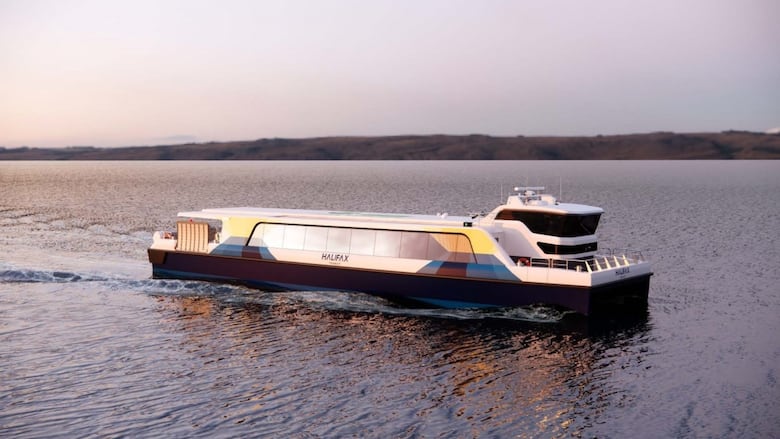New Bedford ferry delayed over land issues, now expected in 2030
Halifax says province leading process to get lands for ferry terminals

The planned high-speed ferry between Bedford and Halifax will be delayed at least two years, the municipality says, because work is being held up by land negotiations.
The ferry is expected to eventually move people between Mill Cove in Bedford and the Halifax waterfront in just 18 minutes.
All three levels of government committed $260 million in funding last year for two ferry terminals and five electric ferries, which were expected to be in place by 2028.
But municipal spokesperson Brynn Budden said Wednesday that work cannot move ahead until the "required land acquisitions" are in place. She said the provincial government is leading the land acquisition, but no money to buy these parcels has been spent yet.
This means completion is now "anticipated to be 2030," Budden said.
"I'm a little disappointed," Coun. Jean St-Amand, who represents the Mill Cove area, said Thursday.

"Let's hope it doesn't push any further than that. I'd love to see ground broken next year."
Once the lands are in place, Budden said the next phase of work includes issuing tenders for the design and construction of both terminals, a ferry maintenance facility, and the purchase of five electric ferries with a capacity of 150 passengers each.
Only $1.9 million has been spent to date on this phase of work, Budden said. About $3 million was spent in the first phase ending in 2022, which included various vessel, environmental and site studies.
St-Amand said the delay is not "entirely unexpected," because he had been told by municipal staff that getting the privately owned lands around the Mill Cove terminal site would be the trigger for major work to begin.
It is unclear exactly which properties are in negotiation, but property records show that developer United Gulf owns lands between the site and Bedford Highway, which St-Amand said is needed for the project.
CBC asked United Gulf if it was in talks with the province about these lands but did not receive a response by deadline.

When asked if the province should expropriate land needed for the ferry project, St-Amand said he would appreciate anything the province could do to "accelerate their planning."
"We're certainly continuing to face ongoing congestion challenges and they're not really getting any better any time soon. So this is a central relief valve for that," St-Amand said.
"Everybody between here and Halifax will experience less congestion on the Bedford Highway."
The Mill Cove ferry is a key part of Halifax's goals to better move people around the city through its rapid transit plan, which includes new bus routes.
The new provincial transportation plan for Halifax and the surrounding areas cites rapid transit as a priority to improve traffic around the capital region.
CBC asked the province whether it would expropriate the land needed for the Mill Cove ferry project, but it could not offer a response by deadline.
Public Works Minister Fred Tilley said this week that rapid transit, light rail and inter-municipal buses could all be a "game changer" for the municipality.
"All of these things will improve the flow of people into the peninsula," Tilley said Wednesday.
Tilley's office has new powers to make transportation infrastructure decisions in Nova Scotia through Bill 24. The legislation also allows the Crown corporation Link Nova Scotia to acquire any facilities or property for a transportation system.

